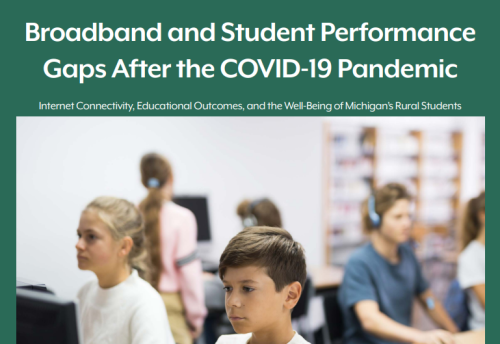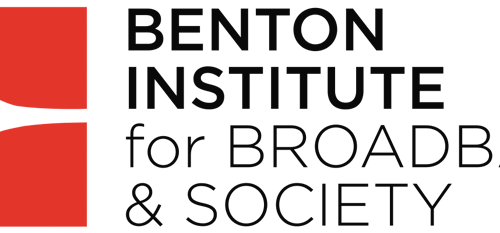January 24, 2022

Johannes M. Bauer, Director, Quello Center
Johannes M. Bauer, Keith Hampton, and community partners will be recognized by Michigan State University on February 24 with the 2022 Distinguished Partnership Award for Community-Engaged Service for their efforts to increase understanding of the cost of digital inequalities to rural students, and to help overcome discrepancies in access to high-speed internet connectivity.
Merit Network, Inc. (Joe Sawasky, Charlotte Bewersdorff), Eastern Upper Peninsula Intermediate School District (Jason F. Kronemeyer), Mecosta Osceola Intermediate School District (Fred Sharpsteen), St. Clair County Regional Educational Service Agency (Kevin D. Miller, Brenda Tenniswood), Washtenaw County Broadband Task Force (Ben Fineman), and the Southwest Michigan Planning Commission (K. John Egelhaaf) are the community partners in this project.

Keith Hampton, Director for Academic Research, Quello Center
“This collaboration began in 2017 as an effort to help overcome discrepancies in access to high-speed Internet connectivity. By 2017, an estimated 27% of Michigan households with school-aged children, many of them located in rural parts of the state, did not have access to broadband connectivity. With our partners, this project put the knowledge and expertise of university faculty and students to work to address real world problems faced by local communities,” Hampton, professor in the Department of Media and Information, said.
The project led by Bauer and Hampton looked to understand the importance of broadband internet access to rural communities, measure the disparities between those rural and urban communities, and to provide a methodology for those communities to close that gap in access. Its success critically depended on collaboration with and support by several community partners. Merit Network, Inc., a regional education network, was instrumental throughout the entire collaboration, as were Eastern Upper Peninsula ISD, Mecosta Osceola ISD, and St. Clair County Regional Educational Service during the initial pilot project.
“After we completed the initial research on broadband and student learning outcomes, released in March 2020, we and our partners developed methodologies to measure discrepancies in community broadband access. A main innovation is the combination of Internet-based crowd sourcing with traditional survey methods to also obtain data on those who are not connected,” said Bauer, Quello Chair in Media and Information Policy.

Joe Sawasky, President and CEO, Merit Network, Inc
“Under the leadership of Merit Network, Inc., our approach has since been developed further and adapted by community partners to specific local conditions. Among the several counties across Michigan, are Washtenaw County, Berrien County, Ottawa County, and is currently rolled out in Ingham County” Bauer, said. “The data allowed schools and counties to adopt remedial measures to expand broadband internet access to households and areas that previously were not served.”
For example, in 2021, the Eastern Upper Peninsula ISD received commitments of $37 million to close the connectivity gaps that had handicapped students, commitments have been put in place to connect all households in Washtenaw County to broadband. Of the approximately 9,000 unserved households in Washtenaw County, half will be connected through the Rural Digital Opportunity Development Fund and the other half by a $14.6 million investment from American Rescue Plan funds.

Charlotte Bewersdorff, Vice President for Community Engagement, Merit Network, Inc.
“So many people in our college are dedicated to community engaged service, as part of their teaching, professional associations, and research-creative activities,” said Hampton. “For me, this work provided a natural opportunity to extend some of the research I have been doing on how local communities are changing and using technologies in innovative ways that can benefit the most disadvantaged.”
“I feel lucky that MSU and our college value theoretical and applied research as well as outreach and engagement that can bring about real change,” Bauer said. “Although the encouragement to succeed in traditional academic pursuits is high and enjoys considerable prestige, impact and contribution to practical problems are also recognized. Our goal at the Quello Center is to do both, and to do both well.”
For access to reports, publications, and policy briefs related to the project please visit https://quello.msu.edu/broadbandgap/. For updates and additional information on work by Merit Networks see https://www.merit.edu/community/moonshot/.
Michigan State University annually awards four university-wide recognitions for highly engaged and scholarly community-based work that positively impacts both the community and scholarship. The Quello Center also congratulates our colleague Joe Grimm, instructor and editor-in-residence in the School of Journalism in our College, who will be recognized with the 2022 Distinguished Partnership Award for Community-Engaged Teaching.
See also ComArtSci faculty win Distinguished Partnership Awards.



